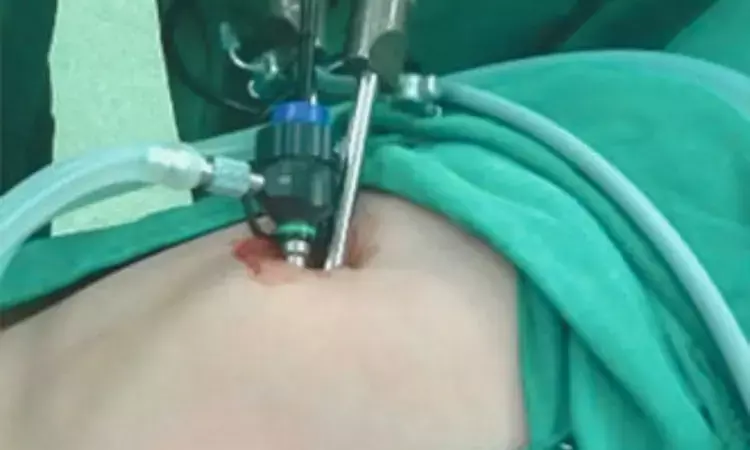- Home
- Medical news & Guidelines
- Anesthesiology
- Cardiology and CTVS
- Critical Care
- Dentistry
- Dermatology
- Diabetes and Endocrinology
- ENT
- Gastroenterology
- Medicine
- Nephrology
- Neurology
- Obstretics-Gynaecology
- Oncology
- Ophthalmology
- Orthopaedics
- Pediatrics-Neonatology
- Psychiatry
- Pulmonology
- Radiology
- Surgery
- Urology
- Laboratory Medicine
- Diet
- Nursing
- Paramedical
- Physiotherapy
- Health news
- Fact Check
- Bone Health Fact Check
- Brain Health Fact Check
- Cancer Related Fact Check
- Child Care Fact Check
- Dental and oral health fact check
- Diabetes and metabolic health fact check
- Diet and Nutrition Fact Check
- Eye and ENT Care Fact Check
- Fitness fact check
- Gut health fact check
- Heart health fact check
- Kidney health fact check
- Medical education fact check
- Men's health fact check
- Respiratory fact check
- Skin and hair care fact check
- Vaccine and Immunization fact check
- Women's health fact check
- AYUSH
- State News
- Andaman and Nicobar Islands
- Andhra Pradesh
- Arunachal Pradesh
- Assam
- Bihar
- Chandigarh
- Chattisgarh
- Dadra and Nagar Haveli
- Daman and Diu
- Delhi
- Goa
- Gujarat
- Haryana
- Himachal Pradesh
- Jammu & Kashmir
- Jharkhand
- Karnataka
- Kerala
- Ladakh
- Lakshadweep
- Madhya Pradesh
- Maharashtra
- Manipur
- Meghalaya
- Mizoram
- Nagaland
- Odisha
- Puducherry
- Punjab
- Rajasthan
- Sikkim
- Tamil Nadu
- Telangana
- Tripura
- Uttar Pradesh
- Uttrakhand
- West Bengal
- Medical Education
- Industry
Study finds no Causal Link Between Appendectomy and Gastrointestinal Cancers in Europeans

A recent study published in the Nature Scientific Reports found that no causal relationship between undergoing an appendectomy and the risk of developing gastrointestinal cancers in the European population. The study used advanced genetic analysis methods which combine data from the UK Biobank and FinnGen study cohorts to provide significant insights into this medical question.
This research employed two-sample Mendelian randomization (TSMR), a robust method to assess causal relationships using genetic data, to estimate the impact of appendectomy on gastrointestinal cancer risks. This approach minimizes biases inherent in traditional observational studies by offering a clearer view of potential associations.
The study was conducted in two parts, the first one being a discovery phase which was followed by a replication phase. In the discovery cohort, the research team used data from the UK Biobank to identify 50,105 individuals who had undergone appendectomy. Genetic variants associated with the procedure were selected as instrumental variables (IVs) to assess causality. The risk of gastrointestinal cancers, including colorectal, stomach, pancreatic, and esophageal cancers, was then evaluated using summary data from the FinnGen study.
To validate these findings, the replication cohort analyzed data from the FinnGen study which comprised of 28,601 appendectomy cases. Instrumental Variables (IVs) were derived and compared against gastrointestinal cancer data from the UK Biobank, ensuring consistency and reproducibility.
The final step involved meta-analysis to combine the causal estimates from both cohorts. Across all analyses, this study found no evidence suggesting that appendectomy increases or decreases the risk of gastrointestinal cancers. These findings align with conclusions from prior observational studies, further reinforcing the notion that appendectomy has no significant impact on cancer risk in the gastrointestinal system.
Instrumental Variables (IVs) were genetic markers associated with appendectomy, used to explore causality in a scientifically rigorous manner. he Discovery Cohort (UK Biobank) filtered 50,105 appendectomy cases and analyzed them to identify potential cancer risk. No causal links were found. In the Replication Cohort (FinnGen Study) a total of 28,601 appendectomy cases were examined to confirm the discovery cohort's results. No associations were observed in this as well.
The combined data from both cohorts conclusively demonstrated no causal relationship between appendectomy and gastrointestinal cancers. Overall, the results from these study provide reassurance to patients and clinicians, suggesting that appendectomy does not influence long-term risks of gastrointestinal cancers.
Reference:
Wang, S., Zhang, T., Sun, Y., Yang, D., & Cao, X. (2024). No genetic causality between appendectomy and gastrointestinal cancers: a Mendelian randomization study and meta-analysis in European population. In Scientific Reports (Vol. 14, Issue 1). Springer Science and Business Media LLC. https://doi.org/10.1038/s41598-024-77600-6
Neuroscience Masters graduate
Jacinthlyn Sylvia, a Neuroscience Master's graduate from Chennai has worked extensively in deciphering the neurobiology of cognition and motor control in aging. She also has spread-out exposure to Neurosurgery from her Bachelor’s. She is currently involved in active Neuro-Oncology research. She is an upcoming neuroscientist with a fiery passion for writing. Her news cover at Medical Dialogues feature recent discoveries and updates from the healthcare and biomedical research fields. She can be reached at editorial@medicaldialogues.in
Dr Kamal Kant Kohli-MBBS, DTCD- a chest specialist with more than 30 years of practice and a flair for writing clinical articles, Dr Kamal Kant Kohli joined Medical Dialogues as a Chief Editor of Medical News. Besides writing articles, as an editor, he proofreads and verifies all the medical content published on Medical Dialogues including those coming from journals, studies,medical conferences,guidelines etc. Email: drkohli@medicaldialogues.in. Contact no. 011-43720751


